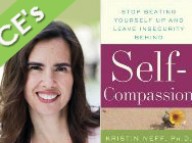A Conversation with Dr. Kristin Neff hosted by Dr. Lisa Firestone – Having compassion for oneself is really no different than having compassion for others. Think about what the experience of compassion feels like. First, to have compassion for others you must notice that they are suffering. If you ignore that homeless person on the street, you can’t feel compassion for how difficult his or her experience is. Second, compassion involves feeling moved by others’ suffering so that your heart responds to their pain (the word compassion literally means to “suffer with”).
When this occurs, you feel warmth, caring, and the desire to help the suffering person in some way. Having compassion also means that you offer understanding and kindness to others when they fail or make mistakes, rather than judging them harshly. Finally, when you feel compassion for another (rather than mere pity), it means that you realize that suffering, failure, and imperfection is part of the shared human experience. “There but for fortune go I.”
Self-compassion involves acting the same way towards yourself when you are having a difficult time, fail, or notice something you don’t like about yourself. Instead of just ignoring your pain with a “stiff upper lip” mentality, you stop to tell yourself “this is really difficult right now,” how can I comfort and care for myself in this moment?
Learning Objectives:
1. Identify the three key components of self-compassion
2. Describe key research that supports the benefits of self-compassion
3. Describe common misunderstandings about self-compassion
To learn more about Dr Neff’s work http://self-compassion.org/
Presenter: Kristin Neff, Ph.D. (Interviewed by Dr. Lisa Firestone)
60 Minutes
$15.00Add to cart
Optional 2 CE Credits sold separately More Info Here
Ordering Information:
Once payment is received, you will be e-mailed a full video recording of this Webinar along with all presentation materials.
Optional CEs (2) may be purchased through R. Cassidy Seminars for $15. A link to purchase CE credits will be included in the email containing all your Webinar resources. More Info Here
About Kristin Neff
 Kristin Neff, Ph.D. is widely recognized as one of the world’s leading experts on self-compassion, being the first one to operationally define and measure the construct over a decade ago. In addition to her pioneering research into self-compassion, she has developed an eight-week program to teach self-compassion skills in daily life, co-created with her colleague Dr. Chris Germer, called Mindful Self-Compassion (MSC). Her book, Self-Compassion, was published by William Morrow in April, 2011.
Kristin Neff, Ph.D. is widely recognized as one of the world’s leading experts on self-compassion, being the first one to operationally define and measure the construct over a decade ago. In addition to her pioneering research into self-compassion, she has developed an eight-week program to teach self-compassion skills in daily life, co-created with her colleague Dr. Chris Germer, called Mindful Self-Compassion (MSC). Her book, Self-Compassion, was published by William Morrow in April, 2011.
Continuing Education Information:
This event is co-sponsored by R. Cassidy Seminars. A link to purchase CE credits will be provided to all Webinar registrants.
Satisfactory Completion
Participants must have paid tuition fee, signed in, attended the entire seminar, completed any accompanying reading assignment, completed an evaluation, and signed out in order to receive a certificate. Failure to sign in or out will result in forfeiture of credit for the entire course. No exceptions will be made. Partial credit is not available.
Psychologists
Cassidy Seminars is approved by the American Psychological Association (APA) to offer continuing education for psychologists. R. Cassidy Seminars maintains responsibility for this program.
Social Workers
Cassidy Seminars, ACE provider #1082 is approved as a provider for social work continuing education by the Association of Social Work Boards (ASWB) www.aswb.org, through the Approved Continuing Education (ACE) Program. Approval Period: April 15, 2012-April 15, 2015. R. Cassidy Seminars maintains responsibility for the program. Social workers should contact their regulatory board to determine course approval. Social workers will receive 2 continuing education (clinical, social work ethics) clock hours in participating in this course.
Please Note: Licensing Boards change regulations often and while we attempt to stay abreast of their most recent changes, if you have questions or concerns about this course meeting your specific board’s approval, we recommend you contact your board directly to obtain a ruling.
Note: Many state boards accept offerings accredited by national or other state organizations. If your state is not listed, please check with your professional licensing board to determine whether the accreditations listed are accepted.







